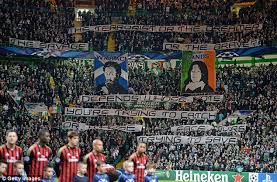By Paul Nicholson
November 29 – UEFA have opened disciplinary proceedings against Celtic after fans unveiled banners depicting IRA hunger striker Bobby Sands and Scottish warrior William Wallace at their Champions League game against Milan. But the Green Brigade fan group who were responsible for the banners have now escalated the issue raising questions about their rights to the freedom of political expression.
Celtic row raises issues for UEFA as Green Brigade defend freedom of expression

